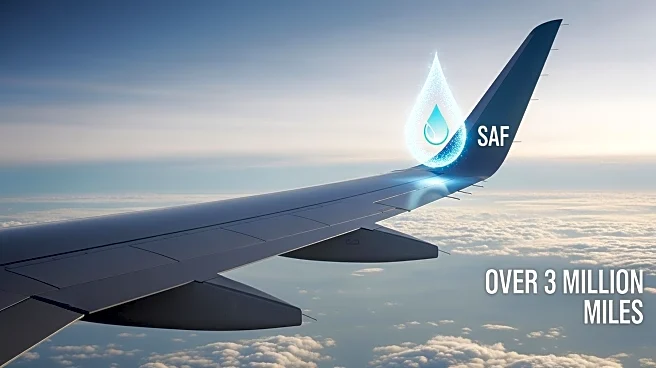What's Happening?
Gulfstream Aerospace has announced that its fleet has flown more than 3 million nautical miles using sustainable aviation fuel (SAF). This achievement underscores the company's commitment to environmental
sustainability within the aviation industry. The use of SAF is set to increase by 50% at Gulfstream's headquarters in Savannah, Georgia, this year. The company has been actively integrating SAF into its operations to reduce carbon emissions and promote greener aviation practices. This milestone reflects Gulfstream's ongoing efforts to lead the industry in sustainable practices and reduce its environmental footprint.
Why It's Important?
The use of sustainable aviation fuel is crucial for reducing the aviation industry's carbon footprint and combating climate change. Gulfstream's significant milestone demonstrates the feasibility and benefits of integrating SAF into regular operations. As one of the leading manufacturers of business jets, Gulfstream's commitment to sustainability could influence other companies in the industry to adopt similar practices. This shift towards greener fuels is essential for meeting global emissions targets and ensuring the long-term viability of air travel. The increase in SAF usage at Gulfstream's headquarters also highlights the growing demand and acceptance of sustainable fuels in the aviation sector.
What's Next?
Gulfstream plans to continue expanding its use of sustainable aviation fuel, with a projected 50% increase at its Savannah headquarters. This expansion is likely to involve further collaborations with fuel suppliers and advancements in fuel technology. As Gulfstream continues to lead by example, other aviation companies may follow suit, potentially leading to broader industry changes. The increased use of SAF could also prompt regulatory bodies to implement more stringent environmental standards, encouraging widespread adoption of sustainable practices across the aviation industry.
Beyond the Headlines
The adoption of sustainable aviation fuel by Gulfstream not only impacts environmental sustainability but also has economic implications. As demand for SAF grows, it could lead to increased investment in fuel production and infrastructure, creating new business opportunities and jobs. Additionally, Gulfstream's leadership in sustainability may enhance its brand reputation, attracting environmentally conscious customers and partners. This shift towards greener practices could also influence public perception of the aviation industry, highlighting its role in addressing climate change.










